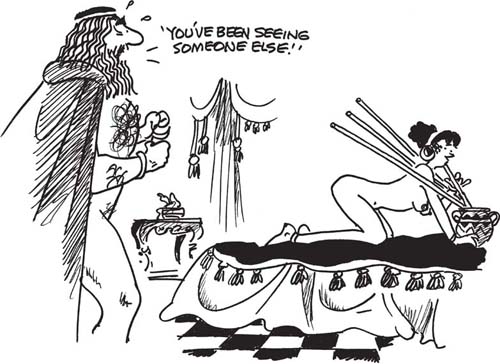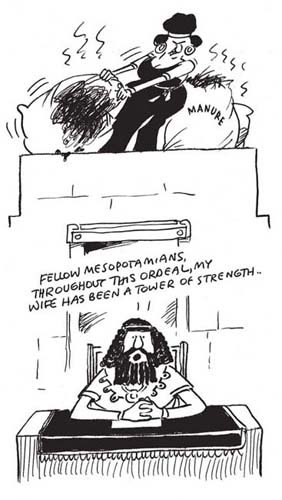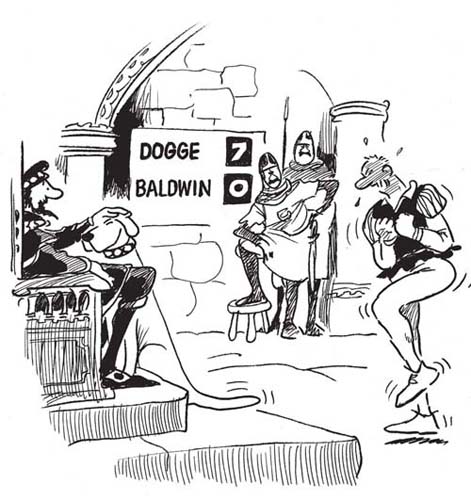Disgraceful Archaeology (6 page)
Read Disgraceful Archaeology Online
Authors: Paul Bahn

23
There are lots of other depictions of bestiality in prehistoric art — our favourite is the Italian petroglyph at Naquane, Valcamonica, showing a man buggering some poor animal while waving happily to the viewer!
Herodotus claimed that in Egypt the wives of notable men, and women of great beauty and reputation, were not given to the embalmers immediately, but only after they had been dead for three or four days, so the embalmers could not have carnal intercourse with them — one was found doing it with a newly dead woman, and was denounced by his fellow workmen. Xenophon of Ephesus says that a man kept the embalmed body of his wife in his bedroom… we don’t know why.
The Roman emperor Tiberius was invited to dinner by Cestius Gallus, a lecherous old spendthrift, and he accepted on condition that the waitresses should be naked. On retiring to Capri, Tiberius made himself a private sporting house where sexual extravagances were practised for his secret pleasure. Bevies of girls and young men, whom he had collected from all over the Empire as adepts in unnatural practices, would perform before him in groups of three to excite his waning passions. A number of small rooms were furnished with the most indecent pictures and statuary obtainable .… and erotic manuals from Egypt. He had nooks of lechery in the woods and glades of the island, and had boys and girls dressed up as Pans and nymphs.
An ingenious torture devised by Tiberius was to trick men into drinking huge draughts of wine, and then suddenly to knot a cord tightly around their genitals, which not only cut into the flesh but prevented them from urinating.
Similarly, the emperor Nero (AD 37–68) invented a novel game; he was released from a den dressed in the skins of wild animals, and attacked the private parts of men and women who stood bound to stakes. And after working up sufficient excitement he was screwed by his freedman Doryphorus, who later married him — on the wedding night he imitated the screams and moans of a girl being deflowered.

24
According to a papyrus in Berlin, King Sneferu of Egypt got bored, and asked his chief magician Djadjamankh what he should do. The magician suggested he go to the palace lake, order a boat, and call for some young girls from his palace — watching them row up and down would cheer him up. He ordered twenty women with beautiful limbs and breasts and braids, twenty young women who had not borne children. And twenty fish nets as well. ‘Let the nets be draped on the women, when they have taken their clothes off.’ (
24
)
At the beginning of his reign, Domitian would spend hours alone every day catching flies, and stabbing them with a needle-sharp pen.
The Greek sculptor Praxiteles (fourth century BC) carved a nude Aphrodite, using his mistress Phryne, a famous
hetaira
(courtesan), as the model .… Pliny relates that one man became so enamoured that he embraced the statue during the night and left a stain on it.…
(Phryne, incidentally, became enormously rich, as Praxiteles
was not her only lover. On one occasion she was charged with profane behaviour and put on trial: defending her was another of her lovers, the orator Hyperides. Seeing that he was making no progress in the case he suddenly decided to take a completely different line of defence so he pulled down her dress, revealing a pair of perfect breasts. Confronted by such beauty, the judges could only acquit her — though a new law was passed immediately afterwards, forbidding the accused to be present in court while the verdict was under consideration .…) (
25
)

25
Elagabalus, the Syrian-born emperor of Rome (AD 218–22), was bisexual and a transvestite. He would frequent taverns at night, wearing a wig, and there ply the trade of a female huckster. He also frequented the notorious brothels, drove out the prostitutes and played the prostitute himself. He ‘married’ a slave who was allowed to beat him like a wife. He also wished to be transformed into a woman, and asked physicians to contrive a woman’s vagina in his body by means of an incision, and promised them large sums for doing so. Another story tells of his delight in a man with peculiarly large private parts, but he lost interest when this man was unable to perform in bed.

26
An ancient Egyptian verse:
When I embrace her
and her arms are open,
I feel like a man in incense land
who is immersed in scent.
When I kiss her
and her lips are open
I rejoice
without even having drunk beer.
An Egyptian papyrus of the nineteenth Dynasty says: ‘Beer robs you of all human respect, it affects your mind, and here you are like a broken rudder, good for nothing.’
There is also an Egyptian fragment of limestone with a drawing on it depicting a king with five-o’clock shadow; In a tomb at Elkab, there is a picture of a high-born woman at a party saying ‘Give me eighteen jugs of wine — I want to get drunk, my insides are as dry as straw’. A painting from Khety’s Tomb,
c
.2100 BC, even shows guests being carried away from a banquet after drinking too much wine.
In a newly-discovered letter from the Roman fort of Vindolanda, in northern England, a commander of a cavalry section wrote to his prefect: ‘The lads have no beer — please send some’.
The British Museum has a Babylonian baked-clay plaque of around 1800 BC that shows a man having sex with a woman from behind, while she bends over to drink beer through a straw. Ancient documents from the period include examples of erotic poetry in which strong connections are made between alcohol and sexual activity! (
26
)

27
In 1400 BC, there was a political scandal in Mesopotamia â the Semitic Museum of Harvard University has cuneiform tablets showing a corruption and sex investigation. Unearthed in northern Iraq in the 1920s, they record a judicial panel's impeachment proceedings against Mayor Kushshiharbe of Nuzi. Dogged by an aggressive prosecution, a political leader denies an illicit affair â âI did not have sex with her', although one of his assistants swears to it. The Mayor was accused of taking bribes (one maid, one complete oxhide and wood for two yokes), and abducting people for ransom (two shekels of gold, one ox and two male sheep), and stealing. He even expropriated manure to fertilize his gardens â Mar-Ishtar, a farmer, said: âThe manure for [one plot] of land the gardener of Kushshiharbe took away from me. So I said “Why did you take away my manure?”, and he said “As for you, the mayor has ordered you to be flogged”.' The mayor was accused of committing adultery with a woman named Humerelli â he vehemently denied the charge, but one of his agents, Ziliptilla, said it was true: âWe brought her to the place of Kushshiharbe,and he had sex with her'. The mayor said: âNo! Emphatically no! Not a word of it is true, I did not have sex with her!' A second man, Palteya, said: âI called to Humerelli and took her over to the brothel of Tilunnaya, and Kushshiharbe had sex with her.' The mayor said âMay I perish if Palteya did bring Humerelli over to the brothel of Tilunnaya that I might have sex with her.' He was also accused of adorning his private home with a gate fashioned from 30â40 pieces of wood taken from the palace gate. The records of the final verdict in the case have never been found ⦠(
27
)

28
The historian Suetonius (AD 69â140) said of the emperor Claudius that he intended to publish an edict allowing to all people the liberty of giving vent at table to any distension caused by flatulence. This was upon hearing of a person whose modesty, under such circumstances, had nearly cost him his life.
The obscene tenures by which certain estates in England were held in âsergeantcy' date back at least to the early fourteenth century: Baldwin le Petteur (note the name) held 110 acres of land in Hemington, County of Suffolk, by sergeantcy, for which on Christmas Day, every year, before our sovereign lord the King of England, he had to perform one saltus, one sufflatus and one bumbulus (or pettus) â i.e. he was to dance, make a noise with his cheeks, and let a fart. As Camden says in his
Britannia
: âSuch was the plain, jolly mirth of those days' (
28
).
Similarly, at Montluçon in France, any prostitute who was about to enter the town for the first time had to pay a toll on the bridge of one fart. According to Victor Hugo, this custom was generally known in France in the fifteenth century, and records of the Montluçon toll system go back to 1398. In England, the stage directions to old Morality Plays often include âHere Satan letteth a fart'. Later, a poem was written called âThe fart censured in the Parliament House', based on an âescape' of this kind that took place in 1607, though possibly it occurred in Elizabethan times (
29
).
The fart was a divinity among the ancient Egyptians, the personification of a natural function. It was depicted as a crouching child making some effort. The ancient Pelusians, a people of lower Egypt, venerated a Fart, which they worshipped
under the symbol of a swelled paunch. Farts were a good omen for the Greeks, a bad one for the Romans.
